Cultural Studies can be understood as a learning function that turns everyday cultural experience into careful interpretation and informed judgment. The inputs include curriculum frameworks that offer guiding lenses, media and cultural texts that serve as the “evidence” of meaning-making in society, and students from diverse backgrounds who bring different perspectives, questions, and lived realities into the conversation. The process is shaped by controls such as cultural theory, social justice perspectives, and political and historical contexts—because cultural meaning is never floating in empty space; it is formed within histories, institutions, and struggles over whose voices are amplified or silenced. The function is enabled by mechanisms like expert faculty who model critical reading, access to cultural sources that broaden what can be studied, and online platforms and discussion that support dialogue, debate, and collaborative analysis. When these elements work together, the outputs become clear: students develop critical and media literacy, sharpen their awareness of power dynamics in representation and social life, and grow into engaged societal participants who can interpret culture thoughtfully rather than consuming it passively.
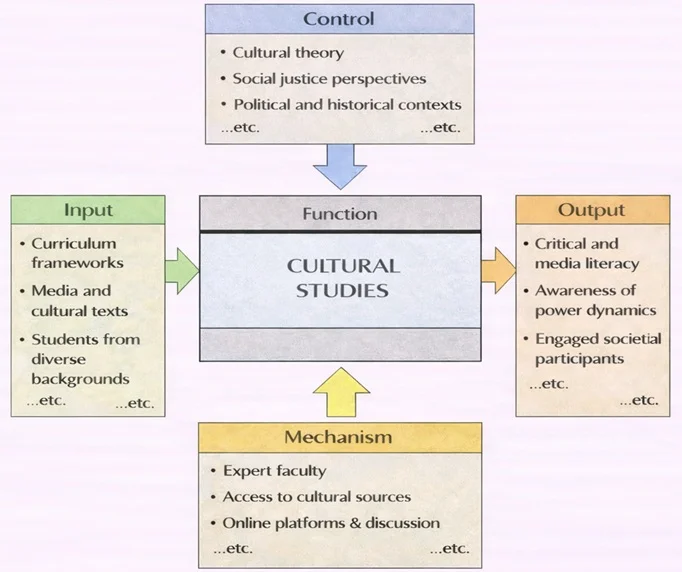
Cultural Studies is an interdisciplinary field that examines the social, political, and economic dimensions of culture in shaping human experience. It goes beyond traditional understandings of culture as art and literature, focusing instead on the everyday practices, media, ideologies, and power dynamics that define societies. Emerging in the mid-20th century, Cultural Studies has become a critical framework for analyzing the complex relationships between culture, identity, and power in a globalized world.
Rooted in disciplines like sociology, anthropology, history, and media studies, Cultural Studies addresses how culture influences and is influenced by issues such as class, race, gender, sexuality, and technology. It provides tools to deconstruct dominant narratives, uncover marginalized perspectives, and understand the role of culture in sustaining or challenging social structures. This field is particularly relevant in today’s world, where cultural flows and conflicts are intensified by globalization, digital technology, and social media.

This illustration captures the spirit of cultural studies as an exploration of how people create meaning through art, music, language, media, symbols, traditions, and social practices. The swirling patterns suggest the dynamic flow of ideas across time and cultures, while the surrounding imagery—from books and architecture to technology and performance—reflects the many influences that shape identity and social experience. For students preparing for university, cultural studies encourages critical thinking about how culture shapes beliefs, values, communication, and power in everyday life, helping learners better understand both themselves and the world around them.
- Humanities & Social Sciences topics:
- Overview
- Anthropology
- Cultural Studies
- History
- Literature
- Philosophy
- Political Science
- International Relations
- Psychology
- Religious Studies
- Sociology
- Linguistics
Table of Contents
Historical Development of Cultural Studies
Cultural Studies originated in the United Kingdom in the 1960s, with the establishment of the Birmingham Centre for Contemporary Cultural Studies (CCCS) by Richard Hoggart, Stuart Hall, and others. This school of thought challenged traditional views of culture as elite and unchanging, emphasizing instead the dynamic and contested nature of cultural practices.
- Key Influences:
- Marxism: Analyzed how culture reflects and sustains class structures.
- Frankfurt School: Explored mass media and its role in perpetuating ideology.
- Post-Structuralism: Focused on how meaning is constructed and deconstructed through language and discourse.
- Feminist Theory: Highlighted gender as a crucial factor in cultural production and interpretation.
Over time, Cultural Studies expanded beyond its British roots, incorporating perspectives from postcolonial theory, critical race theory, and queer studies. It became a global field of inquiry, addressing diverse cultural contexts and issues.
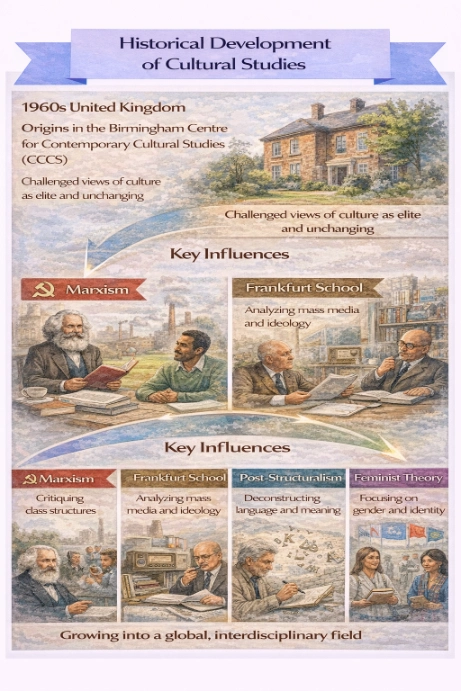
A timeline-style infographic with a UK map and “Founded in 1960s United Kingdom,” highlighting the Birmingham Centre for Contemporary Cultural Studies (CCCS). It then presents four influence panels—Marxism (class/capitalism), Frankfurt School (media/ideology), Post-Structuralism (language/discourse), and Feminist Theory (gender/power)—followed by a “Global Expansion” section with a world map and later frameworks such as postcolonial and critical race perspectives.
Key Themes in Cultural Studies
Power and Ideology
- Overview:
Cultural Studies examines how power operates through cultural norms, practices, and institutions to shape identities and maintain social hierarchies. - Key Concepts:
- Hegemony: Coined by Antonio Gramsci, refers to the dominance of one group’s worldview as the norm.
- Ideology: The system of ideas that naturalizes power relations and social inequalities.
- Applications:
- Deconstructing advertising and media to reveal underlying ideologies.
- Analyzing how cultural institutions perpetuate systems of privilege and oppression.
- Overview:
Identity and Representation
- Overview:
This theme explores how culture constructs and represents identities such as race, gender, sexuality, and class. - Key Questions:
- Who controls cultural narratives?
- How are marginalized identities represented or excluded?
- Examples:
- Examining stereotypical portrayals of minorities in films and television.
- Studying the rise of identity politics in social movements.
- Overview:
Globalization and Cultural Exchange
- Overview:
Cultural Studies investigates the flow of cultural practices, ideas, and commodities across borders in a globalized world. - Key Issues:
- Cultural imperialism: The dominance of Western culture in shaping global norms.
- Hybridization: The blending of local and global cultural elements to create new forms.
- Applications:
- Understanding the global influence of Hollywood and K-pop.
- Analyzing the role of the internet in creating transnational communities.
- Overview:
Media and Popular Culture
- Overview:
Media and popular culture are central to Cultural Studies, as they reflect and shape societal values and ideologies. - Key Questions:
- How do media narratives construct reality?
- What role do popular culture artifacts play in resistance or conformity?
- Examples:
- Analyzing how superhero films reinforce or challenge traditional gender roles.
- Studying the impact of social media influencers on consumer behavior.
- Overview:
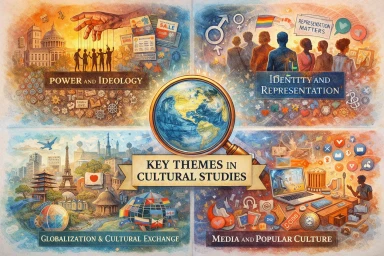
This illustration visually brings together the four core themes of Cultural Studies. At the center, the globe and magnifying glass represent critical inquiry into culture and meaning. Surrounding scenes symbolize power and ideology, identity and representation, globalization and cultural exchange, and media and popular culture. Together, they highlight how culture shapes beliefs, social structures, communication, and everyday life across the world.
Research Methods in Cultural Studies
Cultural Studies employs a variety of qualitative methods to analyze cultural phenomena:
Textual Analysis:
- Interpreting cultural texts (e.g., films, books, advertisements) to uncover meanings and ideologies.
Ethnography:
- Immersive research into cultural practices and communities to understand their lived experiences.
Critical Discourse Analysis:
- Examining how language and communication shape power relations and social identities.
Historical Analysis:
- Exploring how cultural practices and ideas evolve over time.
Applications of Cultural Studies
Education and Curriculum Design
- Developing inclusive curricula that reflect diverse cultural perspectives.
- Promoting critical thinking skills by encouraging students to question dominant narratives.
Media and Communication
- Enhancing media literacy by teaching audiences to critically engage with content.
- Informing the creation of more representative and ethical media practices.
Policy and Social Change
- Advocating for policies that address cultural inequality and promote social justice.
- Supporting grassroots movements that challenge cultural and political hegemony.
Corporate and Market Research
- Helping brands understand cultural trends and consumer behavior.
- Creating advertising campaigns that resonate with diverse audiences.
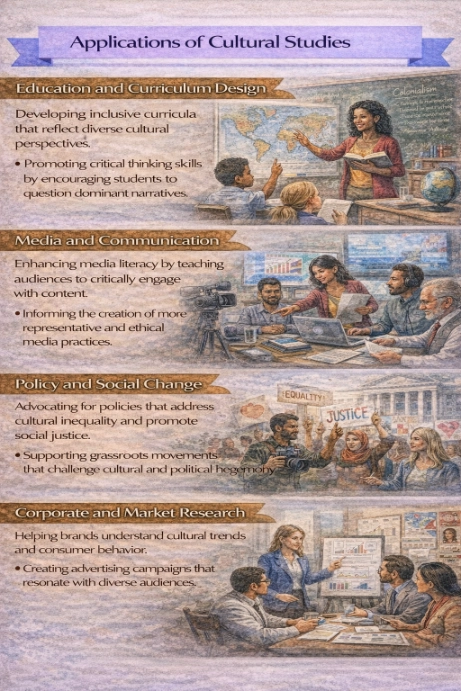
This infographic presents four practical ways cultural studies is used in real life. It highlights (1) education and curriculum design—building inclusive curricula and encouraging critical thinking, (2) media and communication—strengthening media literacy and promoting ethical representation, (3) policy and social change—supporting social justice policies and grassroots movements, and (4) corporate and market research—interpreting cultural trends and consumer behavior to design culturally aware campaigns.
Contemporary Issues in Cultural Studies
Digital Culture
- Investigating the role of the internet and social media in shaping identities and cultural practices.
- Examining the digital divide and its impact on cultural participation.
Cultural Resistance
- Studying how marginalized groups use culture as a form of resistance against oppression.
- Examples include protest art, hip-hop, and social media activism.
Postcolonial Perspectives
- Addressing the legacies of colonialism in shaping global cultural relations.
- Highlighting the voices of formerly colonized societies in cultural discourse.
Environmental Humanities
- Exploring how culture shapes attitudes toward nature and sustainability.
- Analyzing cultural responses to climate change and environmental crises.
Future Directions in Cultural Studies
Interdisciplinary Expansion:
- Integrating insights from neuroscience, AI, and environmental science to deepen cultural analyses.
Global South Perspectives:
- Increasing focus on non-Western cultural practices and epistemologies.
Ethical Research Practices:
- Addressing issues of representation, consent, and power dynamics in cultural research.
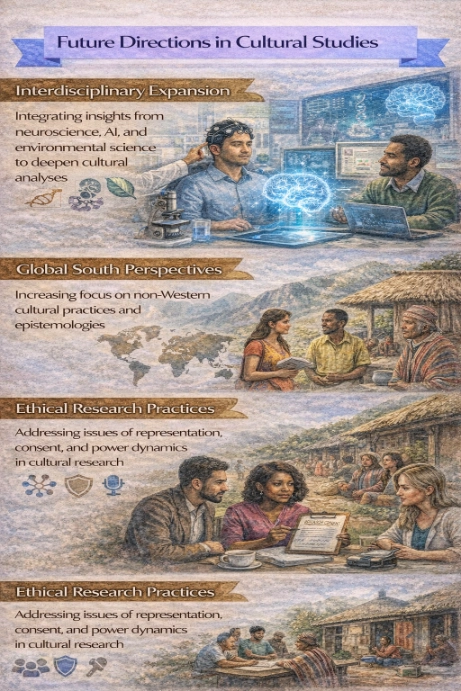
A watercolor-style infographic with a top banner reading “Future Directions in Cultural Studies,” followed by themed panels. It visualizes interdisciplinary expansion through lab and digital imagery (including AI and neuroscience motifs), highlights Global South perspectives through community-based fieldwork and dialogue, and emphasizes ethical research practices with a consent-focused discussion scene and related icons (representation, consent, and power dynamics).
Why Study Cultural Studies
Understanding the Role of Culture in Everyday Life
Exploring Power, Identity, and Representation
Linking Theory to Contemporary Social Issues
Developing Critical Thinking, Research, and Communication Skills
Preparing for a Flexible and Engaged Career Path
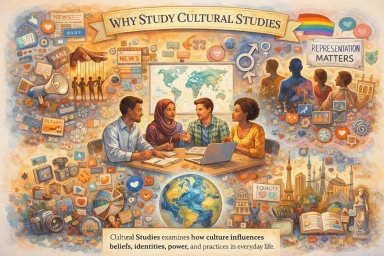
This illustration captures the essence of Cultural Studies as an exploration of how culture shapes beliefs, identities, and social life. The students at the center represent critical inquiry and dialogue, while the surrounding symbols—media, language, global diversity, activism, technology, and representation—reflect the interconnected themes of power, identity, communication, and social change. Together, they convey how Cultural Studies equips learners to think critically about the world and engage thoughtfully with contemporary issues.
Cultural Studies – Frequently Asked Questions
What is Cultural Studies, and what does it focus on?
Cultural Studies is an interdisciplinary field that examines how culture is produced, circulated, experienced, and contested in everyday life. It looks at texts (such as films, social media, music, and literature), practices (from fashion to fandom), and institutions (like schools, platforms, and media industries) to understand how meaning, identity, and power are organised in contemporary societies.
How is Cultural Studies different from traditional literature or media studies?
While literature and media studies often focus on close reading of texts or genres, Cultural Studies places stronger emphasis on how texts are embedded in social relations, history, and power. A Cultural Studies approach asks: Who produces this text? For whom? Under what economic and political conditions? How do different audiences interpret it? It connects detailed textual analysis with questions of ideology, identity, and inequality.
What key concepts are important in Cultural Studies?
Some core concepts in Cultural Studies include representation, ideology, hegemony, identity, discourse, intersectionality, popular culture, subculture, and resistance. Students learn how these concepts help to analyse racialisation, gender norms, class relations, nationalism, colonial legacies, and the politics of everyday life, from advertising and memes to news reporting and streaming platforms.
What methods do Cultural Studies scholars use?
Cultural Studies combines methods from several disciplines. Common approaches include textual and discourse analysis, audience and reception studies, ethnography of cultural practices, archival research, and critical theory. Students may be asked to analyse a media campaign, conduct small-scale interviews, read theoretical texts, or map how a cultural phenomenon travels across different platforms or countries.
Why is Cultural Studies especially relevant in the digital age?
In the digital age, culture circulates rapidly through social media, streaming services, games, and global brands. Cultural Studies helps you make sense of how algorithms shape visibility, how influencers construct authenticity, how online communities form, and how misinformation spreads. It also asks who controls data and platforms, and how digital culture reproduces or challenges existing inequalities.
How does Cultural Studies prepare me for university-level work?
Cultural Studies trains you to read critically, think theoretically, and write analytically about complex, everyday phenomena. You learn to connect concrete examples to abstract concepts, to interpret contradictory viewpoints, and to build arguments supported by evidence. These skills are valuable for university essays, seminar discussions, project work, and research in many humanities and social science degrees.
What topics might I encounter in a Cultural Studies degree?
Typical topics include popular culture and mass media, race and ethnicity, gender and sexuality, youth cultures and subcultures, postcolonial and decolonial thought, cultural policy and creative industries, digital cultures and platforms, visual culture, and cultural theory. Many programmes also include modules on research methods and independent projects or dissertations.
What careers can Cultural Studies support?
Cultural Studies graduates work in diverse areas, including media and communications, advertising and branding, cultural and creative industries, public relations, journalism, policy and advocacy, education, NGOs, user research, and content strategy. The degree strengthens skills in critical analysis, communication, and cultural literacy, which are increasingly valued in globally connected workplaces.
How does Cultural Studies engage with questions of power and inequality?
Cultural Studies developed partly to understand how power operates through culture, not just through laws or formal politics. It examines how representations shape who is seen as normal or deviant, whose voices are amplified or silenced, and how stereotypes become naturalised. At the same time, it looks at how people reinterpret cultural texts, form subcultures, and use creativity to resist or reimagine social orders.
Is Cultural Studies only about popular culture?
Popular culture is a major focus, but Cultural Studies is not limited to it. The field also investigates high art, religion, education, urban spaces, science and technology, and policy debates. What matters is not whether a cultural form is popular or elite, but how it organises meaning, identity, and power, and how it is experienced by different groups.
How can I use the Cultural Studies page on Prep4Uni.online effectively?
You can use the Cultural Studies page as a starting point to explore key concepts, examples, and links to related topics such as media, communication, sociology, or postcolonial studies. Try turning the guiding questions into short practice essays, or apply the ideas to a film, series, advertisement, or social media trend that you know well. This will help you build a portfolio of reflections for university applications or first-year modules.
Do I need prior background in theory to study Cultural Studies?
No formal background in theory is required at the beginning, but a willingness to engage with abstract ideas is important. Prep4Uni.online materials can help you bridge the gap by introducing key thinkers and concepts gradually, always linking them back to concrete cultural examples. Over time, you will gain confidence in reading theoretical texts and using them in your own analyses.
Cultural Studies: Conclusion
Cultural Studies is an essential field for understanding the complexities of human societies and the ways culture intersects with power, identity, and social change. By challenging dominant narratives and amplifying marginalized voices, it equips us with the tools to navigate and shape a rapidly changing world. As globalization, technology, and cultural exchange continue to transform societies, Cultural Studies will remain a critical lens for analyzing and influencing the cultural landscapes of the future.
Cultural Studies: Review Questions and Answers:
1. What is cultural studies?
Answer: Cultural studies is an interdisciplinary field that examines cultural practices, texts, and social institutions to understand how meaning is produced and circulated in society. It combines insights from sociology, anthropology, literary theory, and media studies to explore the relationships between culture, power, and identity. The field critically analyzes everyday cultural phenomena and challenges traditional notions of high versus low culture. This approach enables scholars to interpret the complexities of modern life and the diverse expressions of human experience.
2. How does cultural studies analyze media and art?
Answer: Cultural studies analyzes media and art by examining how they reflect, shape, and challenge societal norms and values. Scholars in this field consider the historical, social, and political contexts in which creative works are produced and consumed. They study visual and textual representations to understand how power dynamics and ideologies are communicated through artistic expressions. This analytical process helps reveal underlying messages and cultural assumptions that influence public perception and social behavior.
3. What methodologies are commonly used in cultural studies?
Answer: Methodologies in cultural studies include qualitative approaches such as ethnography, discourse analysis, and textual analysis. Researchers often engage with cultural artifacts like films, literature, and music to interpret their meanings within specific social contexts. These methods enable a deep understanding of the symbolic dimensions of culture and the ways in which cultural meanings are constructed and contested. By using a combination of interpretive and critical techniques, scholars can uncover the complex interplay between culture, society, and power.
4. How does cultural studies contribute to understanding social identities?
Answer: Cultural studies contributes to understanding social identities by exploring how cultural practices, narratives, and symbols shape the way individuals and groups see themselves and are perceived by others. It examines the construction of identity through language, media representations, and everyday interactions, highlighting the fluid and multifaceted nature of social identity. This field also investigates how power relations and historical contexts influence identity formation and expression. By doing so, cultural studies provides insights into the dynamics of inclusion, exclusion, and resistance within societies.
5. What role does interdisciplinary research play in cultural studies?
Answer: Interdisciplinary research in cultural studies brings together diverse perspectives from fields such as sociology, history, literature, and media studies to create a more holistic understanding of culture. This collaborative approach enriches analysis by integrating different theoretical frameworks and methodologies. It allows scholars to address complex cultural phenomena from multiple angles, yielding deeper insights into how cultural meanings are produced and maintained. Ultimately, interdisciplinary research fosters innovative approaches that challenge conventional boundaries and promote a more comprehensive understanding of human experience.
6. How can cultural studies challenge dominant cultural narratives?
Answer: Cultural studies challenges dominant cultural narratives by critically examining and deconstructing the power structures and ideologies embedded within mainstream media and societal norms. Scholars use critical theory and alternative methodologies to question the assumptions behind widely accepted cultural practices. They reveal the biases and exclusions that often underpin these narratives, offering counter-narratives that highlight marginalized voices and alternative perspectives. By doing so, cultural studies not only critiques the status quo but also provides a platform for social change and cultural diversity.
7. What is the significance of power and ideology in cultural studies?
Answer: Power and ideology are central to cultural studies because they shape the way cultural meanings are constructed and disseminated. This field examines how dominant ideologies maintain social order and influence public consciousness through cultural artifacts and practices. By analyzing the relationship between power, culture, and identity, cultural studies reveals the mechanisms of control and resistance that operate in society. Understanding these dynamics is crucial for challenging inequalities and promoting social justice.
8. How does globalization impact cultural studies?
Answer: Globalization impacts cultural studies by intensifying the exchange of cultural ideas, practices, and artifacts across borders. This increased connectivity has led to the blending of cultural identities and the emergence of transnational cultural forms. Cultural studies examines how globalization influences local traditions, creates hybrid cultures, and sometimes leads to cultural homogenization. It also addresses the challenges and opportunities posed by a globalized world, offering critical insights into the transformation of cultural practices and identities.
9. In what ways does cultural studies engage with issues of diversity and inclusion?
Answer: Cultural studies engages with diversity and inclusion by critically analyzing how cultural differences are represented, valued, and sometimes marginalized in society. It explores the dynamics of power and privilege that affect various social groups, emphasizing the importance of including multiple voices in cultural discourse. This field challenges exclusionary practices and promotes a more inclusive understanding of identity, fostering respect and empathy among diverse populations. Through its critical approach, cultural studies encourages a more equitable society where diverse cultural expressions are celebrated.
10. How can cultural studies inform public policy and social change?
Answer: Cultural studies can inform public policy and social change by providing a critical lens through which to examine cultural norms and power dynamics. By uncovering the underlying assumptions and biases in cultural representations, this field can highlight the need for more inclusive and equitable policies. Its insights help policymakers understand the social implications of cultural practices and design interventions that address systemic inequalities. Through rigorous analysis and advocacy, cultural studies contributes to the development of policies that promote social justice and cultural diversity.
Cultural Studies: Thought-Provoking Questions and Answers:
1. How might digital transformation reshape the future of cultural studies research?
Answer:
Digital transformation is poised to reshape cultural studies research by offering new methodologies and tools that enable the analysis of vast digital archives and social media data. With the advent of digital humanities, scholars can use text mining, data visualization, and network analysis to explore cultural phenomena on an unprecedented scale. This integration of digital tools allows for the identification of patterns and trends across large datasets, providing insights that were previously unattainable through traditional methods. As a result, digital transformation expands the scope of cultural studies, enabling more dynamic and comprehensive research into contemporary cultural trends.
In addition, digital platforms facilitate global collaboration and the dissemination of research findings, making cultural studies more accessible to a broader audience. Online databases and virtual conferences break down geographical barriers, fostering interdisciplinary dialogue and the exchange of ideas. This evolution not only enhances research efficiency but also encourages innovative approaches to understanding culture in the digital age. The future of cultural studies will likely be characterized by an increased reliance on technology, fundamentally transforming how scholars engage with and interpret cultural artifacts.
2. In what ways can interdisciplinary approaches enhance our understanding of cultural identities in a globalized world?
Answer:
Interdisciplinary approaches enhance our understanding of cultural identities by integrating insights from anthropology, sociology, history, and media studies to create a more nuanced perspective on how identities are formed and transformed. These approaches allow researchers to examine the interplay between local traditions and global influences, revealing the complexities of cultural hybridity and transnational identity. By combining different theoretical frameworks, scholars can analyze how cultural identities evolve in response to economic, political, and social pressures, thereby offering a holistic view of the human experience.
Furthermore, interdisciplinary research encourages the use of diverse methodologies, such as qualitative interviews, quantitative data analysis, and visual ethnography, to capture the multifaceted nature of cultural identity. This comprehensive approach provides a deeper understanding of how cultural expressions and practices are influenced by historical legacies, migration patterns, and digital media. Ultimately, interdisciplinary collaboration not only enriches academic inquiry but also informs policies and practices that promote inclusivity and respect for diversity in an increasingly interconnected world.
3. How can cultural studies contribute to decolonizing knowledge and challenging Eurocentric narratives?
Answer:
Cultural studies contributes to decolonizing knowledge by critically examining the historical and cultural biases that have shaped traditional academic narratives, particularly those that prioritize Eurocentric perspectives. By foregrounding marginalized voices and exploring diverse cultural experiences, this field challenges dominant discourses and highlights the richness of alternative epistemologies. Cultural studies employs methodologies that question the power dynamics inherent in knowledge production, encouraging a more inclusive and equitable approach to scholarship. This critical engagement not only reshapes academic discourse but also has profound implications for social justice and cultural representation.
Moreover, by integrating indigenous knowledge systems and non-Western perspectives, cultural studies fosters a more balanced and comprehensive understanding of global cultures. This process involves re-evaluating historical texts, challenging canonical interpretations, and promoting research that reflects the lived experiences of diverse communities. The decolonization of knowledge through cultural studies ultimately contributes to the development of a more pluralistic and just intellectual landscape, where multiple narratives are recognized and valued.
4. What impact does social media have on contemporary cultural expression and identity formation?
Answer:
Social media has a profound impact on contemporary cultural expression and identity formation by providing a platform for individuals to share and negotiate their cultural identities in real time. It facilitates the rapid dissemination of cultural trends, enabling users to engage with a diverse array of influences and to participate in global cultural dialogues. Social media empowers individuals to express their identities through images, videos, and personal narratives, which can both reinforce and challenge traditional cultural norms. This dynamic environment allows for the constant redefinition of cultural boundaries and the emergence of hybrid identities that reflect the complexities of modern life.
At the same time, the influence of social media on cultural expression raises questions about authenticity, representation, and the commercialization of identity. The curated nature of online profiles can lead to idealized portrayals that obscure the multifaceted reality of individual experiences. Moreover, social media algorithms and echo chambers may reinforce existing biases and limit exposure to diverse perspectives. Despite these challenges, social media remains a powerful tool for cultural expression, offering new opportunities for self-representation, community building, and the democratization of cultural discourse.
5. How might globalization challenge or reinforce cultural diversity in the context of cultural studies?
Answer:
Globalization challenges cultural diversity by facilitating the exchange and homogenization of cultural products, which can lead to the erosion of local traditions and practices. The widespread dissemination of global media and consumer culture often promotes dominant cultural narratives, potentially marginalizing indigenous and minority voices. However, globalization can also reinforce cultural diversity by providing a platform for the celebration and preservation of local cultures. Through increased connectivity and the digital sharing of cultural expressions, communities can showcase their unique traditions to a global audience, fostering cross-cultural understanding and appreciation.
Moreover, the tension between global and local influences often sparks creative cultural synthesis, resulting in hybrid forms of expression that enrich the global cultural landscape. Cultural studies explores these dynamics to understand how globalization affects identity, tradition, and social cohesion. This dual impact of globalization—both as a threat to and a promoter of cultural diversity—underscores the need for policies that support cultural preservation while embracing the benefits of global interconnectedness.
6. In what ways can cultural studies address issues of gender and sexuality in modern societies?
Answer:
Cultural studies addresses issues of gender and sexuality by critically examining the ways in which social norms, media representations, and cultural practices shape and constrain these aspects of identity. It explores how gender roles and sexual identities are constructed, maintained, and challenged within various cultural contexts, revealing the underlying power dynamics and societal expectations. By analyzing the intersectionality of gender, sexuality, race, and class, cultural studies provides a nuanced understanding of how multiple identities interact and influence personal and collective experiences. This approach not only highlights the diversity of gender and sexual expressions but also challenges oppressive structures and advocates for greater inclusivity and equality.
Furthermore, cultural studies engages with feminist theory, queer theory, and other critical perspectives to interrogate traditional norms and propose alternative ways of understanding identity. Through interdisciplinary research and critical analysis, scholars in cultural studies contribute to ongoing debates and policy discussions that aim to promote social justice and dismantle discriminatory practices. This work is essential for fostering a more equitable society that recognizes and celebrates the full spectrum of human diversity.
7. How might emerging communication technologies reshape cultural production and consumption?
Answer:
Emerging communication technologies, such as streaming platforms, social media, and mobile applications, are reshaping cultural production and consumption by democratizing the creation and distribution of cultural content. These technologies enable individuals to produce and share art, music, literature, and other forms of cultural expression without relying on traditional gatekeepers like publishers or broadcasters. This democratization leads to a more diverse array of voices and perspectives in the cultural landscape, challenging established norms and fostering innovation. As consumers increasingly access cultural content through digital channels, the traditional models of cultural production are being disrupted, leading to new forms of creative expression and engagement.
Moreover, these technologies facilitate real-time feedback and interaction between creators and audiences, creating dynamic, participatory cultural experiences. The shift towards digital platforms also impacts how cultural value is measured and monetized, often blurring the lines between professional and amateur production. As communication technologies continue to evolve, they will likely further transform the ways in which culture is produced, consumed, and experienced, ultimately reshaping societal notions of creativity and cultural heritage.
8. How can cultural studies contribute to our understanding of migration and diaspora experiences?
Answer:
Cultural studies contributes to our understanding of migration and diaspora experiences by examining how cultural identities are formed, negotiated, and transformed in transnational contexts. Through ethnographic research, textual analysis, and comparative studies, cultural studies explores the ways in which migrants navigate between their home cultures and new environments. This field sheds light on the complex processes of identity formation, cultural retention, and adaptation, highlighting how migration influences social practices and power dynamics in both the origin and host communities. By focusing on these issues, cultural studies offers valuable insights into the lived experiences of diaspora communities and the ongoing challenges they face in maintaining cultural continuity and social integration.
Additionally, cultural studies critically examines the political and economic factors that drive migration, as well as the impact of these movements on cultural production and social cohesion. It addresses themes such as identity loss, hybrid cultural expressions, and the negotiation of belonging in a globalized world. This comprehensive approach not only enriches academic discourse but also informs policy decisions and social initiatives aimed at supporting migrant populations and fostering multiculturalism.
9. What are the potential implications of cultural studies for deconstructing mainstream media narratives?
Answer:
Cultural studies has significant potential for deconstructing mainstream media narratives by critically analyzing the representations, ideologies, and power structures embedded within media texts. By applying theories of discourse analysis and semiotics, cultural studies reveals how media constructs reality, often reinforcing dominant cultural norms and marginalizing alternative perspectives. This critical examination exposes the biases and assumptions underlying media portrayals, allowing scholars to challenge and subvert traditional narratives. The implications of such deconstruction extend to public discourse, as it encourages audiences to question the sources and validity of the information they consume.
Furthermore, by highlighting the voices and stories that are often excluded from mainstream media, cultural studies promotes a more inclusive and diverse cultural landscape. This work not only enriches our understanding of media influence but also empowers individuals to advocate for media reform and greater representation. The insights gained from cultural studies can thus drive social change by reshaping how media content is produced, consumed, and understood.
10. How might cultural studies inform strategies to preserve indigenous cultures in the face of globalization?
Answer:
Cultural studies informs strategies to preserve indigenous cultures by documenting, analyzing, and advocating for the recognition of traditional knowledge and practices. Through ethnographic research and community engagement, cultural studies highlights the unique cultural expressions and histories of indigenous populations. These insights can be used to develop policies and educational programs that protect and promote indigenous heritage, ensuring that these cultures are not lost amidst global homogenization. By emphasizing the importance of cultural diversity and resilience, cultural studies provides a framework for preserving traditional languages, rituals, and art forms.
Moreover, cultural studies encourages the incorporation of indigenous perspectives into broader academic and public discourse. This inclusive approach not only helps to safeguard indigenous cultures but also enriches global cultural understanding. By collaborating with indigenous communities and supporting culturally responsive practices, strategies informed by cultural studies can create sustainable initiatives that honor and perpetuate traditional ways of life in a rapidly changing world.
11. How can the concept of cultural hybridity be applied to understand contemporary identity formation?
Answer:
The concept of cultural hybridity can be applied to understand contemporary identity formation by examining how individuals blend elements from multiple cultures to create new, fluid identities. In a globalized world, people often draw on diverse cultural influences through migration, media exposure, and social interactions, leading to the emergence of hybrid cultural identities. Cultural hybridity challenges the notion of fixed, singular identities and emphasizes the dynamic, evolving nature of cultural expression. This perspective provides a valuable framework for analyzing how traditional boundaries are redefined and how new forms of cultural synthesis emerge in response to globalization and social change.
Furthermore, the study of cultural hybridity reveals how individuals navigate conflicts between dominant cultural norms and alternative value systems. It highlights the creative processes involved in constructing personal and collective identities that reflect diverse influences and experiences. By applying this concept, scholars can better understand the complexities of contemporary identity formation and contribute to more inclusive and representative theories of culture.
12. What role does language play in shaping cultural narratives and social realities according to cultural studies?
Answer:
Language plays a central role in shaping cultural narratives and social realities, as it is the primary medium through which ideas, values, and identities are expressed and communicated. In cultural studies, language is not only seen as a tool for communication but also as a powerful instrument that constructs and reinforces social norms, power structures, and collective identities. By analyzing linguistic practices, cultural studies reveals how language influences perceptions of reality, frames social debates, and determines which voices are heard or silenced. This critical examination of language underscores its significance in shaping societal values and cultural understandings.
Additionally, language serves as a repository of cultural heritage, preserving historical narratives, traditions, and knowledge across generations. The way language is used in media, literature, and everyday communication reflects and shapes the lived experiences of communities. By exploring the interplay between language and culture, cultural studies provides insights into how linguistic practices contribute to social cohesion and transformation. This understanding is crucial for developing strategies to promote more inclusive and equitable forms of communication in an increasingly interconnected world.
